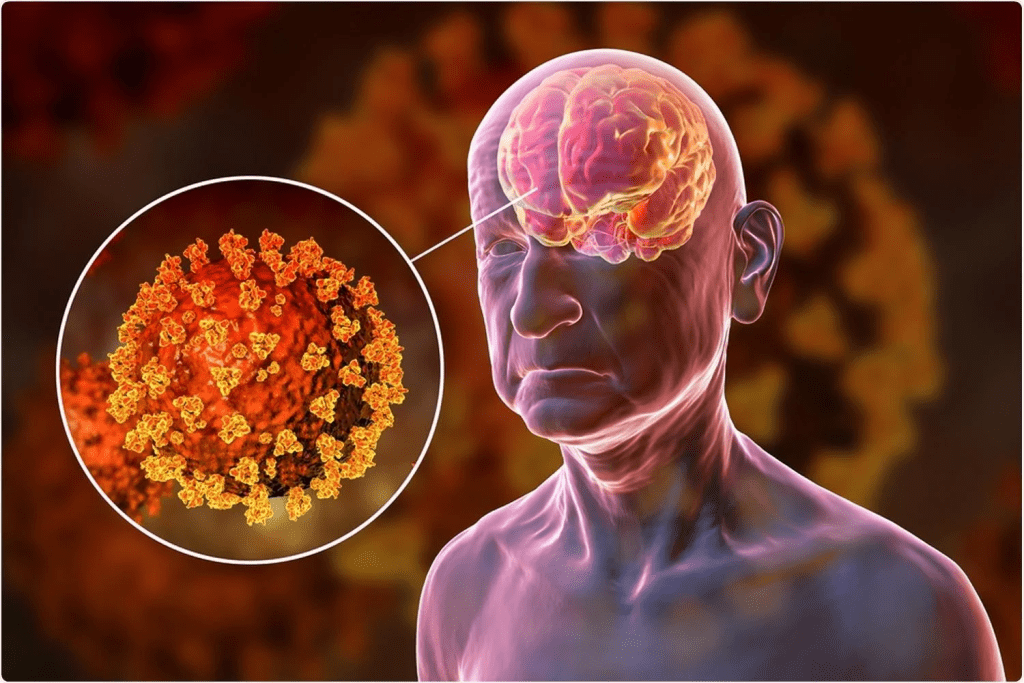When the COVID-19 vaccines were introduced, they marked a historic achievement in science and public health. Billions of lives were saved, and the world slowly started to rebuild. But behind the headlines and success stories, doctors have started warning about extremely rare—yet serious—side effects, including brain inflammation. One case, in particular, has raised eyebrows across the medical community and sparked new discussions about vaccine safety.
The Alarming Case That Sparked Concern

A healthy 60-year-old man from Paris reported strange symptoms—confusion and difficulty walking—just four weeks after receiving the AstraZeneca COVID-19 vaccine. Doctors quickly discovered he had developed meningoencephalitis, a dangerous condition involving inflammation of the brain and surrounding tissues. The timing and symptoms didn’t line up with any infection or virus, leading experts to conclude it might be an immune reaction to the vaccine itself.
Their diagnosis? Postvaccinal encephalitis, a rare neurological reaction potentially triggered by the body’s immune system misfiring after vaccination.
What Is Postvaccinal Encephalitis?
Postvaccinal encephalitis is exactly what it sounds like: inflammation of the brain following a vaccine. It’s uncommon, but when it happens, it’s serious. The man’s condition didn’t improve quickly—his symptoms worsened over time, despite early treatments.
He underwent months of immune-suppressing therapies and finally made a near-full recovery after three years. Still, he continues to suffer from mild attention-related cognitive issues.
Why This Case Matters
This isn’t just a one-off situation. It reflects growing global concerns over post-vaccination syndromes. Some patients have reported ongoing issues like brain fog, dizziness, and memory loss—long after their final dose. While many of these symptoms are temporary, a few cases suggest deeper neurological disruptions.
Video : Dr. Jay Bhattacharya on COVID, Myocarditis, and Vaccines
AstraZeneca’s Role and the Immune System’s Response
Let’s be clear: AstraZeneca’s vaccine has saved countless lives. But it, like all vaccines, comes with rare side effects. Initially, most attention went to blood clot risks. Now, neurological reactions like encephalitis are under investigation.
Researchers believe that the vaccine’s adenovirus component might attract platelet factor 4, a protein that helps with clotting. In rare cases, the immune system might mistakenly attack it, triggering unwanted complications—just as it might in brain inflammation.
Could Genetics Be the Missing Link?
Some people might simply be more vulnerable. That’s where genetic testing comes in.
According to Dr. Alison Cave from the UK’s MHRA, nearly one-third of all adverse reactions to medications could be prevented with the help of genetic screening. Identifying high-risk individuals before vaccination could help avoid future tragedies and allow doctors to recommend safer alternatives.
Beyond AstraZeneca: What About Other Vaccines?
Though this case involved AstraZeneca, concerns have extended to mRNA vaccines like Pfizer and Moderna. Reports of lingering symptoms—sometimes labeled as “post-vaccine syndrome”—are being taken more seriously than ever.

Some researchers believe these reactions might be tied to reactivated dormant viruses like Epstein-Barr. These viruses, once harmless and inactive, could resurface and cause complications when the immune system is triggered by a vaccine.
Still Safe—But Watchful
It’s important to remember: the overall safety of COVID-19 vaccines remains strong. According to the World Health Organization, over 11 billion doses have been administered globally. The number of lives saved and hospitalizations prevented is staggering.
However, even rare side effects can affect thousands when billions are vaccinated. That’s why reporting systems like the Yellow Card Scheme in the UK are essential for identifying and understanding patterns in adverse events.
Families Speak Out
Some families have gone public with their losses. In the UK, Neil Miller collapsed and died in May 2021 shortly after his AstraZeneca shot. His wife, Kam, has since advocated for better aftercare for those suffering vaccine-related complications.
Similarly, Jack Last, just 27, passed away weeks after his jab. These stories, while heartbreaking, are pushing public health agencies to reexamine how they handle side effects, provide support, and build transparency.
Public Pressure for Safer Protocols
The more we learn, the more people are calling for stricter vaccine safety measures. That includes stronger tracking systems, better data collection, and genetic screening before high-risk vaccines are administered.
Experts are also urging that patients with known autoimmune disorders or genetic vulnerabilities be monitored closely. The goal? To ensure maximum benefit with minimum harm.
Video : Doctor testifies on the dangerous side effects of COVID vaccine
Balancing Protection with Precaution
Vaccines have helped us reclaim a sense of normalcy. They’ve protected the elderly, the vulnerable, and frontline workers. But as science advances, we need to hold space for difficult conversations too.
Yes, these side effects are incredibly rare. But that doesn’t mean we ignore them. Transparency builds trust. And trust is vital if we want the public to continue engaging with vaccines in future pandemics.
Final Thoughts
The case of the 60-year-old French man isn’t just a medical oddity—it’s a call for better awareness, screening, and follow-up care. COVID-19 vaccines have been life-saving. But for some, they’ve come with unexpected costs.
If you or someone you know experiences strange symptoms after vaccination, don’t wait. Talk to a doctor. Ask questions. Advocate for tests. And most of all, support continued research into the long-term impacts of these powerful tools.
In the end, medicine is about balance—and we owe it to ourselves to get that balance right.


